The Golden Compass
 for sequences of fantasy violence.
for sequences of fantasy violence.
Reviewed by: Sheri McMurray
CONTRIBUTOR
| Moral Rating: | Extremely Offensive |
| Moviemaking Quality: |
Very Good
|
| Primary Audience: | Kids Family |
| Genre: | Action Adventure Fantasy Romance Adaptation |
| Length: | 1 hr. 53 min. |
| Year of Release: | 2007 |
| USA Release: |
December 7, 2007 (wide); DVD: April 29, 2008 |
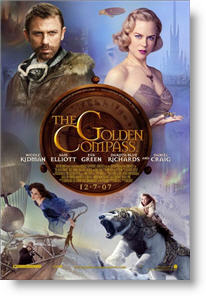
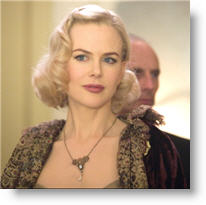

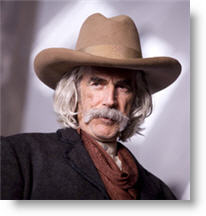
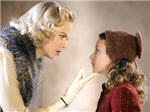
THE OCCULT—What does the Bible say about it? Answer
What is the Occult? Answer
Is Satan a real person that influences our world today? Is he affecting you? Answer
How can we know there’s a God? Answer
What if the cosmos is all that there is? Answer
If God made everything, who made God? Answer
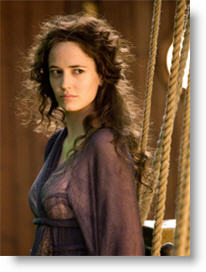
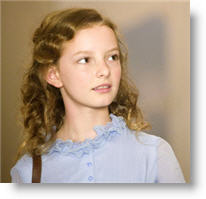
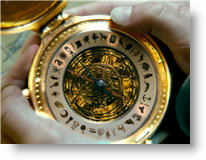
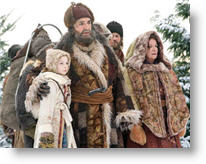

| Featuring |
|---|
| Nicole Kidman, Daniel Craig, Kevin Bacon, Eva Green, John Hurt, Eric Bana, Ian McShane, Sam Elliott, Dakota Blue Richards, Adam Godley, Simon McBurney, Jim Carter, Magda Szubanski, Tom Courtenay, Nonso Anozie, Clare Higgins, Hattie Morahan, Ben Walker, Jack Shepherd, Bill Hurst, Jason Watkins, John Franklyn-Robbins, Charlie Rowe, John Bett, Paul Antony-Barber, James Rawlings |
| Director |
| Chris Weitz—“American Pie,” “American Pie 2,” “About a Boy” |
| Producer |
| Bill Carraro, Toby Emmerich, Deborah Forte, Andrew Miano, Mark Ordesky, Robert Shaye, Paul Weitz, Depth of Field, Ingenious Film Partners, Scholastic Media |
| Distributor |
“It is the Alethiometer. It tells the truth. As for how to read it, you’ll have to learn by yourself.”
“The Golden Compass” is being marketed to children. Your child watches the movie, wants the books, reads the books and gets a whole new perspective of God, which could doom him eternally. Don’t be deceived. The movie is bait for the books. And that makes me more concerned than Phillip Pullman going on record as an atheist. What he says will fade away, but what he has written will remain for unsuspecting minds to read for generations to come. Our work as Christian parents is cut out for us.
Christian parents are no stranger to The Fight, and, although it seems a shame, we must take to the task once again, we have The Word as our two-edged sword.
“God is our refuge and strength, a tested help in times of trouble.”—Psalm 46:1
Dr. Albert Mohler, president of The Southern Baptist Theological Seminary, notes in an article titled “The Golden Compass—A Briefing for Concerned Christians,” that:
“Our agenda is the Gospel of Christ—a message infinitely more powerful than that of The Golden Compass,' Mohler wrote. 'The Christian faith is not about to be toppled by a film, nor by a series of fantasy books.”
Like most of you who are concerned with what The Golden Compass in book form says to our children, I have been reading with great interest what most reviewers, commentators and religious leaders have been saying about Phillip Pullman and his active, fervent put-down of God. Pullman has not been shy about his active disdain for Christianity or his own comments about the stories of Tolkien and Lewis. Here are his own words:
“The Lord of the Rings is just not interesting psychologically; there’s nothing about people in it.”
And his scorn for Lewis’s fantasy world has been widely documented.
“I hate the Narnia books. I hate them with a deep and bitter passion, with their view of childhood as a golden age from which sexuality and adulthood are a falling away.”
He has called the series “one of the most ugly and poisonous things” he’s ever read.
Here is a point Mr. Pullman hasn’t noticed about himself, because he’s been so caught up in his atheistic rhetoric, and that is his stories follow closely the very lines he so venomously discounts.
Pullman is following in the footsteps of Lewis and Tolkien. Like them, he has created alternate worlds of fantasy that vividly manifest his own particular world view and his perspective on spiritual matters. Tolkien and Lewis established the foundation of modern fantasy storytelling, adding to that a beautiful sense of Christian love and friendship. It brings a smile to me to note that Pullman continues the fantasy tradition he so urgently puts down—and most notably in The Golden Compass.
His crafting of his stories, though, is where the similarity ends.
On a more sinister note, Mr. Pullman even sees that he has the edge, because J.K. Rowling has taken most of the public bashing before him. To quote Phillip Pullman:
“I’ve been surprised by how little criticism I’ve got. Harry Potter’s been taking all the flak. I’m a great fan of J.K. Rowling, but the people—mainly from America’s Bible Belt—who complain that Harry Potter promotes Satanism or witchcraft obviously haven’t got enough in their lives. Meanwhile, I’ve been flying under the radar, saying things that are far more subversive than anything poor old Harry has said. My books are about killing God.”
We should be praying for our children and for the effects Phillip Pullman’s books and now the movies will most assuredly have on a new generation coming up in the wake of the fuss over J.K. Rowling and the Harry Potter series.
I believe we should not fuel this author’s negative view of Christianity or of his blatant declaration of being an atheist. We dare not focus on him so much that we wind up making him stand out, while we at the same time risk the Christian community looking like the villainous Christians in his stories.
The best way to expose Pullman’s lie is to respond like Christ himself: With grace and truth.
Putting on the full armor spoken of in Scripture, and praying for our children, teachers and the movie industry and it’s power over the public is where we must begin if we are to make a difference.
“The Golden Compass” focuses on a 12-year-old girl named Lyra (Dakota Blue Richards)and her daemon (pronounced “demon”)—her soul in the form of a talking animal—Pan (the voice of Freddie Highmore). Everyone in her world, in fact, has a daemon, which could range from a monkey to a lion.
Lyra saves the life of her Uncle, the good Lord Asriel (Daniel Craig), from an evil man in power who has tried to poison him. After hearing her Uncle talk about something called the “Dust,” which is symbolic of original sin and knowledge, she is intrigued. Lyra still is wanting to know more about this captivating thing called Dust, but keeps her curiosity to herself, for the time being.
Lyra and Pan are enticed to go and live with the beautiful and alluring Mrs. Coulter (Nicole Kidman)for a while in the wonderful “North.”
Before her departure to the North, Lyra is given an ancient device called an alethiometer. Lyra has no idea that the alethiometer is, in fact, the famed Golden Compass. She is told never to let anyone know she is in possession of it and that it measures “truth.” Once Lyra learns how to read it, she is able to see the past, present and future. The alethiometer becomes Lyra’s source of knowledge, and, as the film progresses, she leans on it more and more for guidance.
Early in the movie, her friend Roger (Ben Walker) is kidnapped by the Gobblers, and she sets out to find and rescue him.
Once Lyra realizes Mrs. Coulter is head of the Gobblers, she and Pan breaks free of her evil hold and, following their escape, meet many animals and peoples who help Lyra in finding not only her dear friend Roger, but to rescue all children being held captive by Mrs. Coulter and her band of Gobblers. Keeping them confined to an experimental station in the far North, the kidnapped children undergo a procedure called Intercision in which their daemons are cut away from them, leaving them without a soul and without a means for Dust to enter their lives as they mature.
Lyra is aided on her quest by Gyptians, a group of sea fairing people who resemble gypsies, an overgrown, gruff-talking armored bear (the voice of Ian McKellen) named Iorek Byrnison, a clan of witches led by the mysterious and beautiful Serafina Pekkala (Eva Green), and a slow-talking Texan aeronaut named Lee Scoresby (Sam Elliott).
“The Golden Compass” is a well-crafted film with top notch special effects and actors. It’s imagery is beautiful and exciting. It easily takes the viewer away into a fantasy world full of intrigue and wonder. Kids love this kind of stuff, and even most adults get a kick out of it, too. Don’t be seduced, however, by what’s on the surface. Underneath lurks many subversive, anti-religious messages which appear in euphemistic terms.
“The Golden Compass” avoids using the word “church” and instead calls it the “Magisterium,” an openly Roman Catholic term. Additionally, in the second and third books “God” is regularly called the “Authority.” And, as you well may have read by now, even if you knew nothing of the Pullman books before now, God is “killed” in the end.
Kids probably won’t pick up on any agenda at all. In fact, they may be so enthralled with the intrigue and adventure of the film that they think of it as nothing more than a great movie about another world of make-believe—assuming they are not scared by several intense scenes and some frightening characters.
Whether we pick up on it or not, Pullman’s demented beliefs are reflected in this first installment of the trilogy for all of the world to see, and that is more than enough reason to stay away from it.
In addition, what is being touted as a children’s movie is very dark and is rated PG-13 for sequences of fantasy violence. Personally, I think “fantasy violence” is an understatement. There is a lot of fighting and death throughout the film, including a bear’s jaw being completely ripped off, not to mention Lyra’s attempt to kill her own mother. There is very little, if any, blood shown, however.
There are a number of twisted biblical references and a play on biblical names. There is some immodesty and sensuality seen in the character of Mrs. Coulter, who is shown always wearing form-fitting 30’s inspired dresses. The consumption of alcohol is present in the movie, and there is a scene where 12-year-old Lyra takes a sip of wine and spits it back into her glass. There is what also sounded to me like one use of the s-word, but I was unable to tell for sure.
Lyra’s character should also be of concern to parents. At times, Lyra appears to be a sweet heroine, whose boldness is commended. But she is also very conniving, manipulative and deceitful, and when she acts in these ways, she accomplishes her purpose. I know there are many times in film and fantasy where this type of behavior appears justified, but Lyra is never ultimately reprimanded for it, and is in fact applauded for it. Parents will not want their children mimicking our heroine.
In the end, as we all very well know, the production must make money in order to warrant the production of the next two movies which cover the last remaining books in the series. Within the pages of these volumes is where the trouble really lies. The final books are the ones which cover Phillip Pullman’s horrific view of God, and Christianity as a whole. If you want to make an impact publicly, instead of verbally bashing Pullman, hit the industry where it hurts. Do not spend your money on tickets. Stay away from the movie, the books and the following films in this trilogy. The Christian community has shown in the past that we are a massive community that has the power to make an impact on sales. I refer here to Mel Gibson’s “The Passion of The Christ” and how we were able as a group to bring it to the forefront, not just publicly, but profit wise.
Pray for Philip Pullman. Pray about the negative influence of his works. And pray for humility and wisdom in your own response. Pullman is a man who, somewhere along the way, has fallen into a perilous pit of treachery.
In closing, I agree with what Jeffery Overstreet of Christianity Today suggests, and I wish to credit and quote him here. This is what Mr. Overstreet extols us as Christians to do:
“Essentially, don’t behave in ways that the Magisterium in Pullman’s books would behave. You’ll just make his stories more persuasive, by confirming for the culture around us that Christians only really get excited when they’re condemning something.
Instead, respond with grace and love. And truth. Admit that, yes, Christians have committed grave sins in the name of Christ, and that those shameful misrepresentations of the gospel have made many people fearful of, and even repulsed by, the church. But Christians have been called to serve the oppressed, proclaim freedom for the captives, bring healing to the sick, to seek justice, to love mercy, to walk humbly, and to bring good news of “great joy.” And by God’s grace, many are living out that calling. They paint quite a different picture than what Pullman has painted.
Finally, educate yourselves and equip your kids with questions—lenses, so to speak—that will expose the problems in these stories. (Worried about padding Pullman’s pockets by investigating the books? Fair enough. But there’s always the library.)
What questions might you and your kids ask as you read Pullman’s books? Some suggestions:
If we cast off all “authority” and set up “free will” as the ultimate source of guidance, where will that get us?
Has the world shown us that the human heart is a trustworthy “compass”?
Does free will lead us always to the right choice?
If the heroes accept the “truth” of the alethiometer (the compass itself), aren’t they letting themselves be guided by just another source of truth—another “Authority”? But didn’t the story tell us “Authority” is bad, and we should only follow our own hearts?
If there are “many truths,” then aren’t these heroes being as self-righteous and wicked as the oppressors by demanding that their version of the truth is better than others?
What is so inspiring about the battle between the bears? Hasn’t this story led us to a place where it’s just “survival of the fittest” all over again? Should we really hope that the world falls into the hands of the strongest fighter, rather than into the hands of love?”
Al Roker of NBC’s Today Show recently even made The Golden Compass part of his children’s book club. And, children are reading it: During an interview with Roker, Pullman took videotaped questions from children about the The Golden Compass. He also took questions on the show’s Web site, where one boy, an 8 year old in Virginia, said he was reading the book with his class. It is being sold nationwide in schools through Scholastic, which also is selling the other two books and claims The Golden Compass is appropriate for grades four and up!
Talk about a temptation. Soon this series will be too prevalent to ignore. We will need strength.
Scripture tells us that God tempts no man. Temptation always comes from the devil. Let not you nor your children be tempted by the wiles of this author or the films his pen will spawn. How do we overcome it? A little child once told of her method. “When the devil comes knocking at my door,” she said, “I don’t answer it. I send Jesus to the door.” Tell your kids that’s the way to take care of it. They don’t have to read the books they shouldn’t, and they don’t have to view movies they shouldn’t, even when all their friends say how great they are.
Send Jesus to the door!
Lord Jesus, help us all to remember the power of Your Holy Name.
Violence: Heavy / Profanity: Minor / Sex/Nudity: None
See list of Relevant Issues—questions-and-answers.
Facts about the books, their author and the film’s director
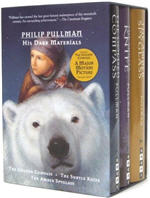

“The Golden Compass” movie is an adaptation of part of an objectionable trilogy of novels (10 million copies sold). Titled His Dark Materials, the books were written to be an influential atheistic counterpart to “The Chronicles of Narnia” and “The Lord of the Rings.” They are aimed at children and were written by anti-God activist Phillip Pullman who was featured in the 2005 documentary series “Why Atheism?”. He is described as “one of England’s most outspoken atheists” by New Yorker journalist Laura Miller.
Director and screenplay writer Chris Weitz (“American Pie” 1 and 2) says “that the film would make no direct mention of religion or God, two of the key themes of the books—a decision attacked by fans of the trilogy. According to Weitz, New Line Cinema feared that ‘perceived anti-religiosity’ would make the film ‘financially unviable’ in the USA. However, Weitz reassured fans by saying that religion would appear in euphemistic terms” (Source: Internet Movie Database).
 In an MTV interview, Weitz reported that “Philip [Pullman] was very involved in the making of the film, from before I became involved myself. …I was adapting his book, which also happened to be one of my favorite books, and the whole thing wouldn’t work for me unless I could turn around at the end of the thing and feel that I had done it to his satisfaction. Thereafter, I was in touch with him all the time …Often we would pass scenes back and forth…”
In an MTV interview, Weitz reported that “Philip [Pullman] was very involved in the making of the film, from before I became involved myself. …I was adapting his book, which also happened to be one of my favorite books, and the whole thing wouldn’t work for me unless I could turn around at the end of the thing and feel that I had done it to his satisfaction. Thereafter, I was in touch with him all the time …Often we would pass scenes back and forth…”
Director Weitz also explained that although he made this first film more acceptable to religious people, he would certainly not water down the sequels. “…I saw it as my duty to build the franchise of His Dark Materials on as solid a grounding as I could… The whole point, to me, of ensuring that ‘The Golden Compass’ is a financial success is so that we have a solid foundation on which to deliver a faithful, more literal adaptation of the second and third books. This is important: whereas ‘The Golden Compass’ had to be introduced to the public carefully, the religious themes in the second and third books can’t be minimized …I will not be involved with any ‘watering down’ of books two and three…” (“‘Golden Compass’ Director Chris Weitz Answers Your Questions: Part I and II,” MTV Movies Blog, November 21, 2007).
About Pullman and his books:
- Pullman said in an interview, “My books are about killing God. …If we’re talking on the scale of human life and the things we see around us, I’m an atheist. There’s no God here. There never was. But if you go out into the vastness of space, well, I’m not so sure. On that level, I’m an agnostic.” [Steve Meacham, “The Shed Where God Died,” The Syndney Morning Herald (December 12, 2003).]
- “Will your kid discover his personal ‘daemon’?” (Linda Harvey, Mission America)
- “Atheism for kids” (Washington Times)
- “Philip Pullman Realizes ‘Killing God’ Not the Ideal Sales Pitch” (New York magazine)
- “This is the most dangerous author in Britain” and “A labour of loathing” (Peter Hitchens, The Mail)
- “Christian Response and Reaction to Pullman and His Dark Materials: The Golden Compass, the Subtle Knife, The Amber Spyglass” (Anthony Horvath, Christian apologist)
- “The Impoverished Imagination” (Prison Fellowship)
- “The Christmas-Crushing Movie” (L. Brent Bozell III, Media Research Center)
- Detailed synopsis/study guide: Pullman’s book, The Golden Compass, titled Northern Lights in the United Kingdom (Spark Notes)
- Two Roman Catholic authors have recently written “a fair, firm, and non-sensational critique of His Dark Materials.” They compare Pullman’s fiction to The Chronicles of Narnia, the Harry Potter books, and other famous works of children’s fiction, and report on faulty metaphysical premises and moral propositions found throughout His Dark Materials—pointing out “many objectionable aspects of the books, including violence and sensuality.” See: Pete Vere and Sandra Miesel, Pied Piper of Atheism: Philip Pullman and Children’s Fantasy (Ignatius Press, 2007).


Moral rating: Good / Moviemaking quality: 4½
Moral rating: Excellent! / Moviemaking quality: 5
The first film is simple enough. In an alternative universe where all people have a companion (called a Daemon although with no evil qualities associated with the name, more like a soul mate) that takes the form of animals, the heroine seeks to rescue a friend and other children kidnapped by the villains. The villains are called the magisterium, and in the film identifiable Christian branding has been removed but they are clearly an alternative version of the dark side of unreformed Catholicism, (although in the book the Pope is John Calvin who sits in Geneva, so Protestants can’t be smug either). This is a power oriented and murderous bunch who are carrying out horrible experiments on the children, essentially saving them from puberty by disconnecting them from their daemon-souls using some high tech electronic equipment. While they claim to be doing the children a favor they are oblivious to the horrible consequences. In other words they also represent the dark side of science as well as religion.
As happens in the fantasy genre, the heroine is helped by the magical compass, a device that tells the truth, and by a collection of various character types, including “gyptians” who resemble gypsies, “witches” who fly and shoot arrows at villains and in later books personify the irrational destructiveness of possessive sexual love, a warrior polar bear seeking redemption who resembles the Lion King or the king of the Lord of the Rings, and a cowboy who flies an airship and otherwise resembles Han Solo of the Star Wars series. Pretty ordinary movie stuff. Extraordinary is Nicole Kidman’s villainous Mrs. Coulter and her nasty monkey demon (who have an interesting scene together) who takes a personal interest in the young heroine.
In general, it is easy to tell who are the good guys and who are the bad guys, although Kidman’s Coulter becomes somewhat conflicted (somewhat like Darth Vader becomes in the late “Star Wars” movies.) Good and evil conflict by human (and bear) violence, as generally happens in these films. If the bad guys represent the bad side of Catholicism, that is why we have Protestants. So what is the big deal?
The film stops short of the first book’s ending where things start getting complicated. While the book series heads in the direction of an alternative Armageddon or Second Garden of Eden wrapped up into one, things are not as simple as detractors think. Commentators try to assign theological roles, that some character is Satan or God or Eve, but the roles do not stand up. Aszreel, who does not appear much in this film, is leading the struggle against “the authority,” and you are never sure to the extent that he is good or evil. God as we know God does not exist in the series, and the so called “authority” is not God at all. The “acting God” Melatron is an angel who is also a former human, but represents the power of evil and is actually done in by sacrificial human acts as much as happens in The Lion, Witch and Wardrobe. The scientist Mary resembles Martin Luther as much as the serpent of Genesis. “Dust” is a mixture of the dark matter predicted by science, free will, the life force, sexual maturity and original sin. And the journey to the underworld may recall Greek myths and its ultimate outcome—more Buddhist than traditional Christian.
However, the bottom line is that neither a God nor a church worthy of the name is attacked in this series, although abuses of these concepts are. The author uses alternative universes to wrestle with a number of theological problems, and these are problems that defy easy solutions, but good and love and integrity and responsibility prevail. And isn’t that what true Christianity is about?
Moral rating: Good / Moviemaking quality: 4½
Moral rating: Average / Moviemaking quality: 2½
Moral rating: Average / Moviemaking quality: 1½
The overall protagonist is The Magesterium, an entity resembling a critical reference to the offensive attitudes and history of the Roman Catholic Church and it’s struggle with authority and oppression in the world. Be that as it may, that’s history, and it is not overstated in the film. See it with your kids and talk about it afterward. Both the movie and the books are an engaging medium to have insightful discussion about the foundations of Christian belief and about church history. (The books are written at about a level I think middle schoolers can begin grappling with, if they are so inclined.)
Phillip Pullman clearly lays out alternate views of the Fall of Man and the garden of eden story, as well as many ideas relating to secular humanist philosophy and finally a fantasy of a second rebellion of the angels in Heaven—but on a wider scale, where God is portrayed as a tyrant. Seriously objectionable stuff your kids will all encounter eventually.
Philip Pullman’s view of Christianity is not really what Christianity is about (i.e., God wants to bar his creation from knowledge and pleasure, etc.) Lots of guides out there if you need prep or help, too. A book called Shedding Light on His Dark Materials looks promising, but I’ve yet to obtain a copy.
I think it is most beneficial to get your hands a little dirty and take these philosophical ideas on, these arguments against Christian foundations. Phillip Pullman’s trilogy is the kind of material has the ability to capture a young mind’s interest, and if a parent or mentor embraces that interest—they can likely gain a new understanding of a young persons actual worldview, helping uncover their questions about God, and about life. It offers an enviroment where one can allow a free flow of what-ifs and ideas and where a parent can point out how persuasive arguments are championed, both for and against Christ.
Don’t hide this from young people, teach them how to take it apart.
Moral rating: Average / Moviemaking quality: 4
Offensive / 2
Offensive / 2
I will first judge this movie on a “Quality” basis so that when I delve into the religious aspects, you will see that I am not being biased upon my own personal beliefs in Christ.
Based upon the trailers for this movie, I was expecting a movie that would give Narnia and “The Lord of the Rings” a run for its money. The trailers made this movie look absolutely amazing, full of special effects, storyline and peril. However, after looking at my clock over 4 times during the movie, nothing could be further from the truth. You have a movie with “good” special effects, but certainly not great. You have acting that is sub par from the child stars, and you have a storyline that is a relative snoozer for adults.
Special Effects: After watching “The Lord of the Rings,” everything just pales in comparison. Therefore, this movie just seemed totally fake. The “Demons,” who represent the animal partner of the humans, just look totally fake. They look like computer-generated visual effects, rather than a real animal. Personally, when I am watching a movie, I want to be taken out of reality into another world, but I do not want to be taken into a realm where it seems fake. The CGI special effects just look bad. Example: When the kids are riding on the back of the Polar Bear, its looks totally hokey and unreal. When you have a movie that has good special effects, you are not supposed to be able to tell that things are fake. In that regard, this movie fails miserably.
Visuals: The set design and cinematography is nothing less than awesome. …the movie is an absolute visual masterpiece and should be nominated for an Academy award for such. It is absolutely beautiful to look at, and the costumes are amazing.
Acting: The kids are really unconvincing, where as in the Narnia series, you were sucked into another world where you believed the kids had conviction about where they were going. In this movie, you had the complete opposite. Rather, you had kids that looked like they were getting paid to play a role. On the flip side, you have Nichole Kidman who certainly fits the “uber babe” title. She is one of the most sophisticated and beautiful actresses to hit the modern cinema. Not to mention, she is one of the most talented actresses in Hollywood today. Even though the script was so bad, she was stellar. Sam Elliot was also very good for the limited time he was in the movie. Everyone else was just bad or “ok”.
Gaps: There were many areas in the movie where the editing just seemed to be bad. Places where I was thinking, “how did he or she know that, they just got there?”, “that part did not make sense” and other questions about seemingly self-confused sections of the movie. This …really hurt the movie a lot, because of the frequency of the bad editing and writing.
Boring: The movie was nothing less than slow for the majority of the post 2 hour movie. You have a movie where the previews make it look exhilarating and exciting, but it brutally fails to keep the audiences attention. I kept looking at my watch multiple times throughout the movie. On the flip side, the Polar Bears were awesome and the fight scenes were good, and the final battle was not too shabby as well. But again, comparing this movie to LOTR and Narnia, they were far shorter and less engaging.
Spiritual:
First let me give you some insight into what I saw in the movie about the definitions of some of the aspects of the movie. This will set the precedent for what I am going to tell you later:
• The Golden Compass: (Ouija Board) A Ouija (Weegie) Board that tell the truth to the “special” holder of the item.
• Demons: (The alter-ego of the Humans—Spirit guides) Each human has a Demon that is an animal-shaped friend that represents the other half of the human. When the Demon is hurt, so is the human and visa versa. (Demons are Good.)
• Witches: The witches are the persecuted friends of the many of the humans.
• The Magistrate: (The Church) The magistrate is run by who many would consider the Pope. This is a Christian/Catholic church that is contrived of false gospel in order to control the humans. They fear one thing the most, “The Dust” which will reveal their plan of false doctrine. They kill anyone who is about to reveal the “truth” and they kidnap kids in order to brain wash them to believing the doctrine of the church.
• The Dust: This is the “Forbidden Fruit”, the knowledge of Good and Evil. This is the truth that the magistrate is so afraid of. This is the truth that will see “humans” free to believe and live as they want. The dust gives the knowledge that man does not need anyone else but ones self in order to live a “free” life. That personal choice is all that matters. The dust, clears ones mind and gives insight.
• Lord Asreal: (The Devil) Asreal is the father of the little girl Lyra that is set to lead a charge against God and the magistrate. He is also one of the heads of the movement to prove that the church is full of lies and deceit. (Think Lord Israel, purposefully named I am sure.)
• Lyra: (The Anti-Christ) She is the leader of the leader of the revolt against the magistrate and God (in the later books and you find out toward the end) They call her the “chosen one” who was prophesied about (Think the “Good” Anti Christ) She is the possessor of the Golden Compass.
• Marisa: (The Great Whore) Lyra’s evil mother played by Nichole Kidman. She is set out to kill Lord Asreal and stop the revolt against God and the magistrate.
Personal Opinion:
For everyone who does not like Harry Potter, then you should be far more offended by the material in this movie. Whereas Harry Potter is a story about some kids who are born as witches and warlocks, practicing innocent magic to save themselves or their friends. “The Golden Compass” is the story about how evil Christianity is, and how it is a man-made religion created only to control the human race.
In this movie, The Magistrate is used as the figurehead of the Catholic Church and is murdering and kidnapping kids and adults alike who desire to have “free wills” and “knowledge.” They know that if the human race figures out that religion is man-made that they will rebel, and it will be the end to controlling the world. They also understand that if the human race becomes free-thinking people, then they will lose control. They set out to kill Lord Asreal who has discovered the location of “Dust” which has given man knowledge—that will make man know they are more powerful than the magistrate and ultimately God. (Think the tree of good and evil and the forbidden fruit.)
As the Lord Asreal is on his quest to find the Dust. His daughter, Lyra is on a quest to save the kids who have been kidnapped by the Gobs. She knows that the magistrate is behind everything, so she must go to the North Pole and save her kidnapped friends who are being brainwashed into not pursuing knowledge. With the assistance of the Witches, Her Demons and the Polar Bear heir, the movie comes to a climactic final battle.
Messages to Kids:
• Christianity is a lie created by the Catholic/Christian Church—Magistrate.
• Adam and Eve only wanted knowledge, and God stopped them from achieving that goal in the Garden.
• Free Will is the enemy of religion
• Man, Woman and Child should choose their own path and reject any religious influence.
• Demons and Witches are good.
Upcoming Books: They do kill God in the end and free will prevails.
Message to Parents: I cannot encourage you enough to prohibit your kids from watching this movie. I personally have a hard time understanding why some Christians would let their kids watch a movie that is 100% anti-Christian, and a movie that is 100% an insult to the God we worship.
…I never go on “boycotts,” and even when the Harry Potter movies came out, I refused to review it, because I actually enjoyed the movie. However, this is what I call a “No Brainer” do not watch movie. Every dollar that is used to sell tickets, goes toward making the sequel. Therefore, every dollar a Christian spends on watching this trash, tells the studios that this kind of movie reaches across the demographic line, and that Christians are not bothered by this garbage.
…with “The Golden Compass,” you are subjecting your kids to manipulation, deceit and satanic doctrine designed to turn your kids away from the Creator, Jesus Christ.
Extremely Offensive / 2
Extremely Offensive / 1
Many people were okay with the Harry Potter books and movies, but I see them as helping to pave the way for acceptance of Pullman’s books, and of this movie as well as the yet-to-be-made movies based on His Dark Materials, even though Pullman’s books were written first. Both Harry Potter and “The Golden Compass” are in a different category from the LOTR movies and from the Narnia series in that this movie (along with the book) and Harry Potter promote the practice of the occult arts specifically forbidden in Deut. 18.10-12 and elsewhere, while LOTR and Narnia do not do this.
The aleithometer is a divination tool. As a former professional astrologer, I recognized this from the descriptions of how Lyra “reads” its messages in the book, “The Golden Compass.” God says in First Samuel 15:23 that “rebellion is as the sin of divination” (some translations say “witchcraft” instead of “divination,” because essentially these Hebrew terms mean the same thing—the practice of occult arts).
Lyra is intelligent, loyal, and persistent (sounds like Harry Potter, doesn’t it?). The idea of challenging authority in order to have one’s own will reign unbounded is a theme of this movie and book, as well as the central philosophy of sorcery and the occult.
Moral rating: Very Offensive / Moviemaking quality: 4
Moral rating: Offensive / Moviemaking quality: 4
Average / 2½
Offensive / 4
Moral rating: Extremely Offensive / Moviemaking quality: 2
Moving onto the religious issues of the movie, there is really nothing that I saw to be glaringly offensive. It is a clear destruction of the true intentions of the movie to draw parallels between absolutely every character and biblical or religious references, for to do so, one would have to dedicate their entire movie-watching time to reaching desperately for such allegories. At no point in the movie, or anywhere in the entire series does Lyra ever dedicate herself toward “killing God.” Lyra is the embodiment of childhood innocence, the picture of altruism, one who must fulfill a promise to her best friend to protect him if anything should happen to him. The characters around her do have less than honorable intentions, but they are not the ones we are rooting for—we are behind Lyra, and her dedication of saving children from torture, and uncovering the mysteries behind Dust.
From watching the first movie, we are not yet sure of what Dust is, but reading ahead in the books we can tell that it is a mark of consciousness—of free will. The ruling power in the series wishes to have absolute control of everyone, so that is why they wish to cut apart the children from their souls (their daemons), since their souls generate the capacity for free will. This is not a tirade against Christianity, in fact, it is a warning to every religion (or non-religion) that there is. It is a message to everyone not to hide cruelty behind “good intentions,” and that there are terrible consequences for betraying the spirit of what one truly believes. The ruling power is less of a religious organization and more of a totalitarian government, since they have utterly betrayed the values that they should be called to follow through their religion; love, respect, kindness, and have instead chosen to do the exact opposite. This series is not pointing out the flaws of religion itself, it is pointing out the flaws of mankind and how corruption, greed, and desire for power can destroy something that would otherwise be positive and fulfilling. It should be interpreted for what it is—a warning to all people, regardless of religion, that no one has the right to harm or attack another person for what they believe.
I implore you, please do not judge a work from what you may hear. The notion of “killing God” is utterly and terribly misinformed, God never actually dies in the series. (spoilers) When Lyra and her friend find God, they wish to help him since he has been trapped by the Magistrate, and used as a tool for their own evildoing. They free him, and once he is freed, he dissolves into the air and becomes one with everything in the world, a part of every living and breathing thing. I do not know how others interpret it, but I see it as the purest sense of being alive, as I would picture God.
As for the issue of daemons and witches being good in the series, I must address what a daemon is in Lyra’s world. It is not a cruel, tempting, or vile creature. It is a physical incarnation of a human’s soul. As for the witches, they are exactly like people—there are good witches, and bad witches. A name is simply a name; I may call a bird a fox, but that does not change what a bird is. The daemons could be called “animal-friends” and no one would have a problem with that, since there is no negative connotation attached to that name. We must examine what exactly something is before judging it based on its name.
Again, I would like to reiterate that it is not the church that is being targeted, it is the corrupted few of humankind who reach power and find ways of controlling others. I did not see this movie as a proponent of atheism, or an attack on Christianity—I saw it as a testament to the power of courage and love. It is rated PG-13, so small children would naturally not be able to see it, but for teenagers and adults, please view it with an open mind. If you are strong in your faith, and can understand and interpret the novel without a clouded perspective of what is truly there, then there is nothing offensive in it. …
Better than Average / 5
Jesus Savior pilot me, Over Life’s tempestuous sea
Unknown waves before me roll; Hiding rock and treacherous shoal
Chart and compass come from thee, Jesus Savior pilot me


Of course, $150 million dollars will buy you much fancier visual effects than Flash Gordon used to have, and the money shows up on screen. “The Golden Compass” is BEAUTIFUL to watch on a big screen. Its blend of CGI and actors is much more seamless than the Narnia movie, which I felt was very inconsistent in its texture as it tried to blend CGI with makeup and live actors.
The actors in “The Golden Compass,” particularly the children are much better than the child actors in Narnia (with the exception of the exceptional Tilda Swinton) were. The lead, Dakota Blue Richards, is a wonderful young actress. It’s also nice to see the lead hero be a young girl this time. Nicole Kidman radiates glamour and menace in her role, but I was surprised by her screen time—I’d say she was on screen for no more than 20 minutes.
Watching the film, I was quite astounded to see that this material is being boycotted by so many Christian groups in the US. I realize the author is a devout athiest, but the film is hardly anti-Christian, or anti-religion—it’s anti-authority messages are not really subversive. Overall, the film is a fun fantasy ride, perfectly appropriate for older children. It comes no where near “The Lord of the Rings” films in terms of cinematic impact, but I would rate “The Golden Compass” with the Harry Potter films (and behind the great Azkaban episode, directed by Alfonso Cuaron) and just ahead of the tepid Narnia film.
My Ratings: Good / 3½